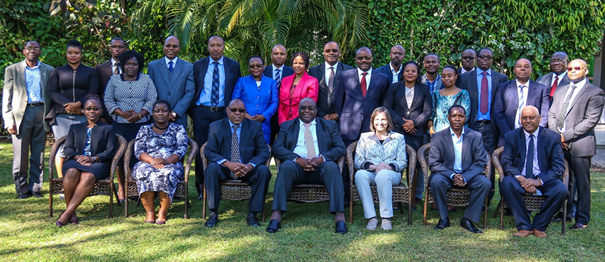- July 21, 2017
- Posted by: admin
- Category: Current News


Macroeconomic statistics are essential for evaluating a country’s economic performance and for making bilateral and multilateral comparisons. They also provide the framework for planning, formulating, and monitoring the implementation of economic and budgetary policies. While considerable progress has been made by MEFMI Member States in adopting the latest international manuals for compilation of macroeconomic statistics, the quality of data produced and its availability leaves a lot to be desired.
It is against this background, that MEFMI organized a retreat for Heads of Statistics, which took place in Livingstone, Zambia from 3-5 July 2017. The overarching objective of the retreat was to provide a platform for strategic debate and exchange of views on improving the quality, timeliness and dissemination of macroeconomic statistics produced by client institutions in the region, using regional and international best practices, and standards. Whilst MEFMI has conducted several retreats in the past, it was the first time to hold a forum for Heads of Statistics.
A total of 20 senior level officials from 11 out of the 13 MEFMI member countries attended the workshop. Participants included Heads of Statistics Departments from Central Banks, Heads of Macroeconomic Departments from Ministries of Finance and Heads of National Accounts from National Statistics Offices.
The retreat also benefitted from representation of Technical Cooperating Partners (TCPs) that included Ms. Claudia Dziobek, Real Sector Division Chief of the International Monetary Fund (IMF) Statistics Department, Mr. Mubila Maurice, Chief Statistician from the African Development Bank (AfDB), Mr. Munalula Themba, Head of the Statistics Unit at the Common Market for Eastern and Southern Africa (COMESA) Secretariat, Mr. Ibrahim Zeidy, Director of the COMESA Monetary Institute, and Mr. Samuel Njuru, Statistician at the East African Community (EAC) Secretariat.
The retreat was officially opened by Dr. Emmanuel Pamu, the Director Financial Markets Department- Bank of Zambia, who was representing the Governor, Dr. Denny Kalyalya. In his opening remarks, Dr. Pamu commended MEFMI for its relentless effort and commitment in building sustainable capacity within the region. He underscored the importance of macroeconomic statistics in supporting evidence based policy making. He hoped that the retreat would provide a platform for strong networking links to foster long-term exchange of ideas and experiences that would strengthen the harmonization of compilation practices in the region.
Speaking earlier, the Director Macroeconomic Management Programme at MEFMI, Dr. Sehliselo Mpofu, acknowledged the continued support of the Government of Zambia towards MEFMI capacity building efforts. She also thanked the Technical Cooperating Partners for their participation at the Retreat. She informed participants that strengthening the quality of macroeconomic statistics was a key objective under the current MEFMI Phase V Strategic Plan (2017-2021).
The retreat covered various aspects of data quality, standards for data dissemination, including communication with data users, and cooperation among data agencies. It also looked at the role of big data and administrative data, and gender statistics. The retreat also included sessions on harmonisation of statistics in support of regional integration, and regional platforms for data dissemination. It also provided a platform for sharing of country experiences on the status of compilation of the four macroeconomic accounts namely National Accounts, External Sector, Fiscal Accounts and the Monetary and Financial Account.
In addition to sessions covered by officials from the TCPs, some sessions were facilitated by the Macroeconomic Management Programme technical staff namely Dr. Sehliselo Mpofu, Ms. Vivian Namugambe, Mr. Senei Molapo and Mr. Sayed Timuno. A gender expert, Ms. Diana Byanjeru from the Uganda Bureau of Statistics was also engaged to facilitate the session on gender statistics focusing on country experience.
The main outcome from the retreat was that it provided an insight of the key priority capacity gaps of the represented countries in the production and management of macroeconomic statistics and related technical assistance requirements, which will inform implementation of activities going forward.
